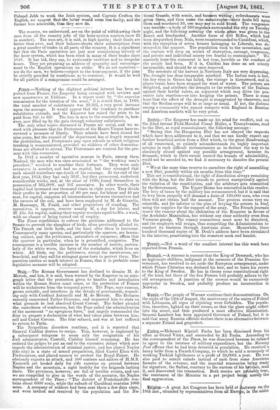,frain.—Nothing of the slightest political interest has been re- ported
from France, the Emperor being occupied with reviews and new manceuvres at Chalons. In a report made by " the superior commission for the dotation of the army," it is stated that, in 1860, .the total number of enlistments was 29,501, a very great increase upon the average. It would appear that the tendency to purchase substitutes extends, and the Imperor has raised the price to be paid from 801. to 921. The loss in men to the conscription is, how- ever, now filled up by the gain through voluntary enlistments.
The only other topics discussed in France are social, and we re- cord with pleasure that the Protestants of the Haute-Vienne have re- covered a measure of liberty. Their schools have been closed for nine years, but the council of the department has at length removed the prohibition, and Protestants may open schools in which 'religious teaching is communicated, provided no children of other denomina- tions are allowed to attend. The Protestants are content for the pre- sent with this concession.
In 1852 a number of operative masons in Paris, among them Nadaud, the man who was once nominated as " the working man's president," resolved to combine their fortunes. They were only seventeen in number, and had no capital, but they arranged that each should contribute one-tenth of his earnings. At the end of the first year, 1852, they had only 364f., but they persevered, undertook considerable works, and, at the close of 1860, found themselves in possession of 365,000f. and 107 associates. In other words, their capital had increased one thousand times in eight years. They divide their profits in the proportion of 60 per cent. for labour and 40 per cent. for capital, suppress all intermediaries between themselves and the owners of the soil, and have been employed by M. de Girardin, M. Haussaye, M. Fould, and other proprietors of standing. The operatives, it appears, receive usually 4f. a day for labour, and 2f. 25c. for capital, making their regular receipts equal to 30s. a week, with no chance of being turned out of employ.
The Times republishes in animas° the petitions addressed to the Senate to prevent the slaughter of birds, often previously. alluded to. The French eat little birds, and the hunt after them is incessant. -Consequently many species, and particularly the sparrow, are becom- ing extinct, and the petitioners, naturalists of eminence, affirm that the sparrow in particular, when he is proscribed, emigrates. The consequence is a terrible increase in the number of insects, particu- larly of the white worm, the larva of the cockchafer, which lives on wheat. All birds, say the petitioners, except the carnivorous, are beneficial, and they call for stringent game-laws to protect them. The question excites so much interest in France, that it is probable some legislative measure will be adopted.






























 Previous page
Previous page